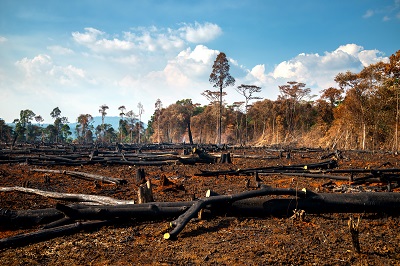
Scientists have investigated the links between the COVID-19 pandemic and the deterioration of the world’s ecosystems and their biodiversity, discovering feedback loops that suggest a potential increase in future pandemics.
University of Queensland Master of Conservation Biology graduate Odette Lawler, collaborating with a team of students and fellows contributing to the study in Professor Salit Kark’s Biodiversity Research Group, said that the links between biodiversity loss, habitat degradation and zoonotic disease transfer had long been understood, but it’s taken an international pandemic to bring the issue to public attention.
“COVID-19 has shown the world that human health and environmental health are intricately linked,” Ms Lawler said.
“We’ve long known that issues like land-use change, intensive livestock production, wildlife trade, and climate change drive the emergence of zoonotic diseases, as they increase human-wildlife interactions.
“Now we’ve also found that these issues are being compounded by outcomes of the COVID-19 pandemic, resulting in feedback loops that are likely to promote future zoonotic disease outbreaks.
“For example, research has found that rates of deforestation have substantially increased in many regions around the world over the course of the COVID-19 pandemic.
“This is likely due to some combination of pandemic-related factors, including decreased enforcement of forest protections, relaxation of sustainability agreements and environmental deregulation, increased pressures on low-income communities, and threats to Indigenous land managers.
“This means that COVID-19 – a pandemic sparked by a pathogen spilling from animal to human populations – has played a part in fuelling further deforestation, which in turn increases risk of future zoonotic disease emergence by increasing human-wildlife interactions.”
The research team stressed that responses to COVID-19 must include actions aimed at safeguarding biodiversity and ecosystems.
Senior researcher UQ’s Professor Salit Kark, who led and supervised the study said that such responses would benefit from adopting what is known in public health and conservation circles as a One Health approach.
“One Health is a collaborative, transdisciplinary approach that aims to optimise health outcomes for communities arising from factors operating, for example, at the intersections between people, animals and their shared environment,” Professor Kark said.
“It’s an approach that can help holistically address outbreaks before they happen, working closely with the community and engaging people in preventative ecosystem and human health.
“Here in Australia, the emphasis should be on developing close, long-term collaboration and engagement with First Nations communities and other partners to address these risks.
“And, internationally, Australia has so many valuable ties, which can be strengthened through working together with other nations to address the drivers of zoonotic disease emergence. In this paper, for example, the team closely collaborated with a group based in Nepal working in the area.
“It’s vital we invest in protecting biodiversity and ecosystem health and address the drivers of zoonotic disease.
“If we don’t, we really are increasing the likelihood of future zoonotic disease emergence and further pandemics arising, and we now all know just how world-altering and high-impact they can be.”
The research has been published in The Lancet Planetary Health (DOI: 10.1016/S2542-5196(21)00258-8).
Media: Ms Odette Lawler o.lawler@uq.net.au, +61 431 920 695; Prof. Salit Kark, s.kark@uq.edu.au; Dominic Jarvis, dominic.jarvis@uq.edu.au, +61 413 334 924.



